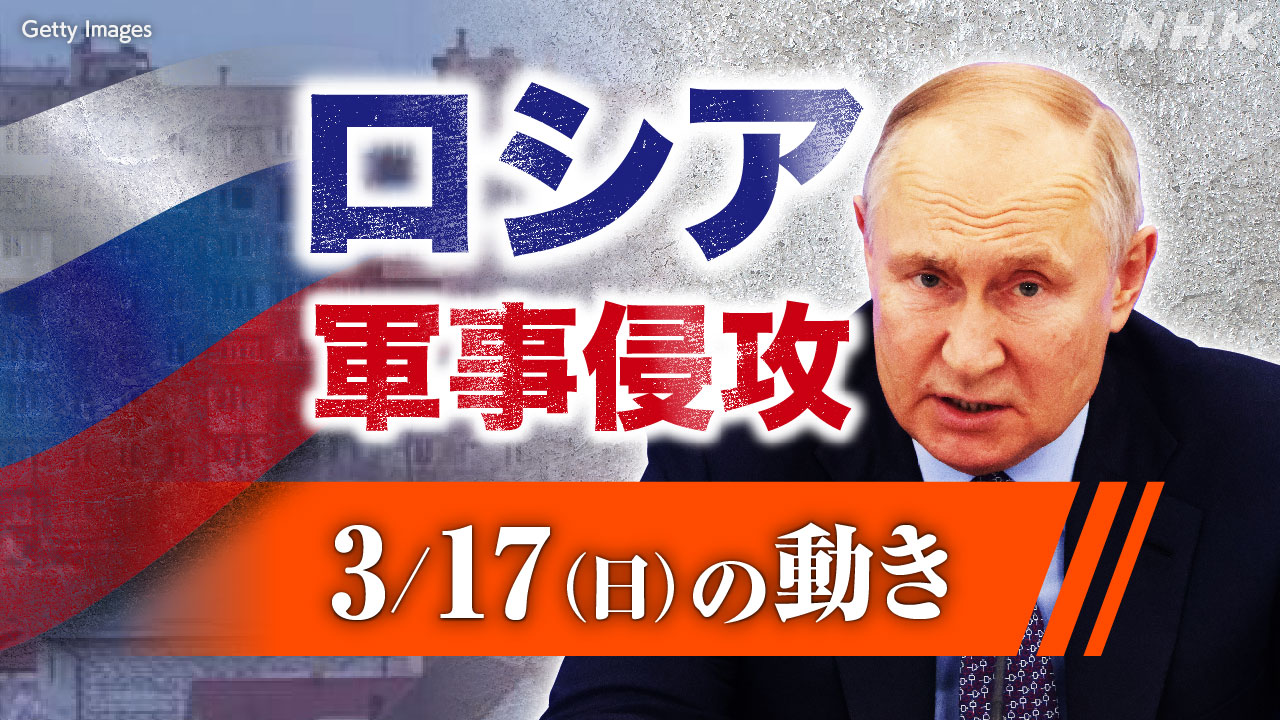Russia's military invasion of Ukraine continues.
Russian and Ukrainian forces continue to fight in various parts of Ukraine, and many civilians have fled the country.
We will keep you updated on the developments surrounding the situation in Ukraine on the 17th (Japan time), including the situation of the battle and the diplomacy of the countries involved.
(There is a 7 hour time difference between Japan and Ukraine, and a 6 hour time difference with Moscow, Russia)
table of contents
Last day of voting in Russia's presidential election: government is wary of anti-establishment protests
table of contents
table of contents
Last day of voting in Russia's presidential election: government is wary of anti-establishment protests
Exchange of attacks intensifies in border area between Russia and Ukraine?
Cross-border attacks believed to be from the Ukrainian side continued on the 16th in Belgorod Oblast in western Russia, which borders Ukraine, resulting in the deaths of at least two people, according to the local governor.
On the 16th, an organization of Russian volunteers fighting on behalf of Ukraine, which has claimed responsibility for the series of attacks, released a statement on social media, calling the presidential election currently being voted in Russia a "travesty." He criticized President Putin and demanded his resignation.
Additionally, in Sumy Oblast in northern Ukraine, which borders Belgorod Oblast, at least three people were killed in an attack from the Russian side on the 15th, and local authorities said that residents had begun to evacuate in droves. It appears that exchanges of attacks by both sides are intensifying in the border area.
Meanwhile, there have been a number of drone attacks on oil-related facilities in Russia, and the governor of Samara Oblast in the central region said on the 16th that two refineries of Rosneft, Russia's largest oil company, were attacked. It was revealed that a fire broke out in one.
Ukrainian media reports that the attack was carried out by the Security Service of Ukraine, with the aim of weakening Russia's economic strength to support continued hostilities.
Last day of voting in Russia's presidential election: government is wary of anti-establishment protests
There are four candidates running in Russia's presidential election, including President Putin, and the three-day voting period reached its final day on the 17th, and after closing at 3 a.m. Japan time on the 18th, votes were counted immediately. will be done.
In this election, candidates such as former members of the House of Representatives who criticize the military invasion of Ukraine are not allowed, and it is certain that President Putin will win his fifth term in total.
Meanwhile, Yulia, the wife of Mr. Navalny, the opposition leader who died last month, and support groups are voting for candidates other than President Putin at noon local time on the 17th, and Mr. Navalny's name is on the ballot paper. He is calling on his supporters to express their intention to protest against the Putin regime.
In response, Russian authorities have repeatedly warned that acts such as interfering with voting will be subject to punishment, including imprisonment, and the regime, which wants to produce an overwhelming victory for President Putin, must be on guard to prevent the protests from spreading. It seems to be getting stronger.
Russia refuses to accept 706 people as election observers
According to Russia's state news agency, the Central Election Commission announced on the 15th that it had certified 706 people from 106 countries as election observers.
Observers are dispatched by countries and international organizations with the consent of the country holding the election, and they monitor voting and vote counting to ensure that fair and democratic elections are being held.
Russian media and other sources have reported that observers are coming from the United States, China, Iran and Syria in the Middle East, and Uruguay in South America.
According to the CIS (Commonwealth of Independent States), which is made up of former Soviet states, members are also dispatched from member countries such as Belarus and Kazakhstan.
In addition, Russian state media reports that observers are not only in Russia, but also in Russian-controlled areas in eastern and southern Ukraine.
Meanwhile, according to the Ministry of Foreign Affairs, Japan will not be dispatching observers this time.
Japan has previously dispatched observers to elections held in Russia, and during the last presidential election six years ago, it dispatched academic experts specializing in Russian politics and officials from the Elections Division of the Ministry of Internal Affairs and Communications.
In addition, the OSCE (Organization for Security and Co-operation in Europe) has dispatched observers to ensure that candidates are accepted, that the media handles candidates during the election period, and that those in charge of polling and vote-counting stations follow procedures. We have monitored every step of the way and pointed out problems.
According to the OSCE, the Russian side issued a statement saying it was "deeply regrettable" that it did not accept the observers.
In response, the Russian Ministry of Foreign Affairs asserted that ``the quality of international monitoring activities will not be compromised even without OSCE monitoring.''

